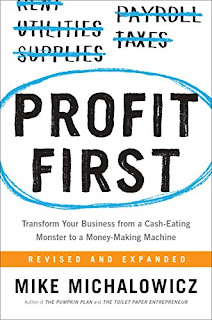Profit First Summary
Tag Line: Profit First shows you how to kickstart your business growth by identifying what’s wrong with traditional methods for managing finances and how you as an entrepreneur can change things up so that you earn more and that your business can reach new heights.
Whether the percentage is 50 or 90 one thing’s for sure, a lot of businesses fail within the first five years. You’re hoping it won’t happen to yours, and you have hope that you’ll make it.
But deep down you worry that doing what everybody else is will lead to failure.
Right from the get-go, many entrepreneurs try to get more sales and scale fast. But this, and other traditional advice about startups, is actually wrong.
Well don’t fret, whether you’re brand new to entrepreneurship, have failed already, or are just looking into it, you can learn the pathway to a sustainable company that makes you rich.
The trick is to prioritize profit, which Mike Michalowicz will teach you how to do in Profit First: Transform Your Business from a Cash-Eating Monster to a Money-Making Machine.
Here are 3 of the most insightful lessons about entrepreneurship from this book:
1. The reason so many businesses get hung up in debt is that the regular way of doing things makes you fight against human nature.
2. If you want to be more successful at managing your finances you must work with smaller amounts of money.
3. Your profits, and your company, will go further if you look for ways to make your business more financially efficient.
Let’s get right into these lessons and see why what you think you know about business is wrong!
Lesson 1: Following all the traditional business advice leaves you struggling because it goes against human nature.
There are endless businesses out there, each with differences. One thing in common, though, is that their owners all want profit.
The usual pattern that executives try to follow looks something like this:
1. Sell a ton of products
2. Minus out expenses
3. Keep the rest!
If this really worked, then why did a survey by Global Entrepreneurship Monitor find that 80% of surveyed businesses closed between 2013 to 2015? The problem is the formula, which is backward.
For one, Parkinson’s Law gets in the way. Discovered by Cyril Northcote Parkinson in the 50s, this law states that how long it takes to finish anything depends on how long you have to get it done.
In simpler terms, if you have three days to get something done, it’ll take you three days. The same works with money. If you know how much is available, without subtracting profit first, you’ll find ways to spend it all.
The Primacy effect also affects income. It states that you tend to pay more attention to what comes first and ignore everything else. So that means when profit is last, you don’t account for it, and thus, don’t get enough.
Instead, begin by finding out what you want to earn and taking that out from your estimated sales. You’ll work with what you have left and always end up with your profit when all is said and done!
Lesson 2: Work with smaller amounts of money if you want to successfully manage your finances.
Parkinson’s Law also affects your ability to eat healthy portion sizes. When you get a big plate of dinner, for example, you naturally fill it completely full, right? Your business finances are the same way.
The author had a big aha moment when he learned about this. He realized that he was using just one account for all of his money and ended up spending it all every month. Spending less, he figured, required him to work with smaller amounts.
To do this he recommends setting up five different accounts for these purposes:
• Main income
• Profits
• Owner’s salary
• Taxes
• Operating expenses
When the company makes money it goes straight into the main income account. From there, you can transfer it as you need into the other accounts, beginning with the one for profit.
Make sure to use each account for only the purpose you’ve set it aside for. Pay your bills from the operating expenses one, and make sure taxes only come from that account.
If you feel tempted to break your rules, just keep certain accounts out of sight! Make sure to do this with the profit and tax accounts at the very least, and keep them at separate banks for safety.
Lesson 3: Ask yourself how you can make your business more financially efficient to take your profits and company to the next level.
The other day I remembered I had some rewards from a wellness activity with my health insurance. After looking into it I got $100 that I hadn’t expected at all!
We all love the feeling of having unexpected income like this. And you can even have this experience in your business, too.
Start by looking at how effective you are at what you do. Are there places where you need to cut costs? Could you work faster in some areas? Never underestimate the big benefits that can come from little changes!
UPS discovered the power of small improvements back in 2006. They realized that left turns were costing time and money for their delivery drivers. After teaching them to avoid left turns, the company began saving $6 million a year!
Also, look at the way you do business and who you serve. Do your customers have different needs? If so, you might be wasting time and money bouncing around between unrelated tasks.
If you find out what you’re best at and double down on it, you can earn more in less time. I know because that’s how I quit my job and started to make more money in ¼ of the time!
Final Words
I went into reading Profit First thinking of the book People Over Profit, which made me think I wouldn’t like it. But I was pleasantly surprised, and I think you will be too! Even as a small business owner these tips are incredibly useful, and I believe they will also help my personal finances as well.








